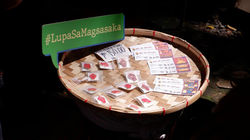Salu-salo 2022
Salu-salo 2022


Bungkalan Kumustahan Day 2

Bungkalan Kumustahan Day 1

Cooking demo sa Agroecology Fair!

 |  |  |  |
|---|---|---|---|
 |  |  |  |
 |  |  |  |
 |  |  |  |


RECLAIM OUR LAND, RECLAIM OUR FOOD SYSTEM!
Forward the Filipino People’s Agenda Towards a Filipino Food System!
Fifty days into the Marcos Jr. administration and agriculture department leadership, the country is mired deep in a ravaging food crisis. Remaining faithful to the neoliberal dogma his father introduced to the Philippines and perpetuated to this day by oft-recycled economic managers, the new president has so far forwarded no new solutions. This food crisis has only made more apparent the need for the Filipino people to reclaim the country’s food system.
The sugar industry is in a mess. Top sugar executives have resigned following the approval of sugar imports allegedly not cleared with Malacanang. Hoarded smuggled sugar stocks were revealed amid an alleged unprecedented shortage. The price of white onion has skyrocketed as it has virtually disappeared in some stores. The trade department has approved a hike in the suggested retail price (SRP) of dozens of basic commodities, just as food prices remained the leading contributor to the latest hike in official inflation estimates. Similarly, three years into the Rice Liberalization Law, official monitoring of the price of rice shows it has remained above its SRP. Meanwhile, government estimates of rice farmer incomes reveal consecutive annual drops since 2019 as the country remains the global top rice importer. Price hikes in imported fertilizers and oil continue as well.
Corporate-led faux “solutions” or techno-fixes to food production wreaking havoc in our agricultural lands, rich biodiversity and farmer’s livelihood remain enabled, if not actively pushed, by our government such as the introduction of “climate-smart” technologies, cultivation of highly contaminative and genetically engineered crops and the use of environmentally-destructive agricultural inputs. Packaged as solutions to fundamental problems in our food system, these made our food frontliners–the small farmers who feed our country– the poorest, landless, most vulnerable and victimized by political repression.
Ultimately, both official and self-rated hunger and poverty statistics have risen.
Echoing his predecessor, the Marcos Jr. administration has pinned the blame on recent external emergencies: the Covid pandemic, the Ukraine-Russia conflict, and the food export bans of other countries.
Despite these devastating events, what remains the fundamental reason behind the Philippines’ vulnerability to outside phenomena, in the first place, is its own chronic and internal agricultural crisis and general economic feebleness. The current global food crisis has found fertile ground in the country’s persistent agricultural backwardness, feudal land monopoly, import-dependence for agricultural inputs, fixation on for-export agricultural production, and rampant conversion of agricultural lands for urbanization without Filipino industrial development.
These problems are not new and have only worsened since neoliberal policies were first imposed in the country in the 1980s, under the Marcos Sr. dictatorship. After over forty years of the neoliberal policy regime, economic managers remain enthralled by this doctrine which has so obviously failed the Filipino people.
Instead, the problem is again forwarded as the solution; the symptoms are used to justify the disease. Despite soundbytes proclaiming his administration’s prioritization of agriculture, Marcos Jr. has not departed from neoliberal dogma which has for decades legitimized foreign plunder of Philippine agriculture.
He has shown zero interest in a new and genuine agrarian reform program. He has not even recognized the extent of the problem with the wanton conversion of productive agricultural lands to commercial or residential uses. He has never recognized the one-sided and colonial nature of foreign “free trade” agreements or World Trade Organization directives. The list goes on. Genuinely resolving the country’s deep-seated problems cannot even begin as they are not even properly acknowledged by those in power. They cannot be solely relied upon to resolve this food crisis.
Thus, the need for Filipino farmers and the people in general to reclaim the country’s food systems has only become more imperative. Central to this is the main productive resource in agriculture, land.
Almost a year after the National People’s Food Systems Summit, a counter-summit of those left behind and excluded in conversations about decisions on our food systems, we reiterate and remain steadfast in forwarding the Filipino People’s Agenda Towards a Filipino Food System. These calls include:
( 1 ) Stop the liberalization and foreign domination on food;
( 2 ) Implement genuine land reform;
( 3 ) Achieve just prices and wages;
( 4 ) Strengthen Filipino agriculture and develop rural and national industries;
( 5 ) Fund Filipino food;
( 6 ) Ensure sufficient and immediate support in times of calamity;
( 7 ) Promote farmer-led research and development; and
( 8 ) Advance the people’s democratic rights.
Agroecology X with all advocates for the people’s right to food and the movement asserting food sovereignty will continue to challenge policy-makers to resolve the food crisis by addressing it in its roots. Forward the Filipino People's Food Agenda!





